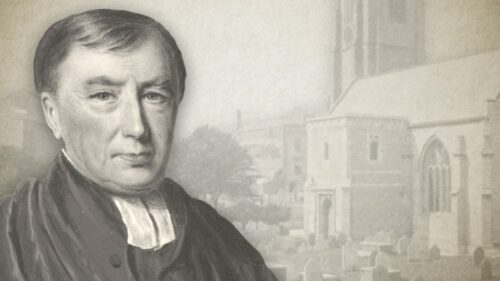
September 8—Morning Devotion
“Ye have dwelt long enough in this mount.”—Deuteronomy 1:6
Pause, my soul, and remark the gracious words of God to Israel. They were just entering the border of Canaan at that time. Forty years long had they been in a wilderness state; many ups and downs, battles and restings, conflicts and trials. God graciously said, “It is long enough.” “There is a rest that remaineth for the people of God.” Hark, my soul, doth Jesus speak to thee to the same amount? Hast thou indeed dwelt long enough in this mount of exercises, sin, sorrow, and temptation? Hast thou seen enough of the emptiness of all creature comforts to satisfy thee? Hast thou felt enough of a body of sin and death, which drags down the soul, to make thee groan under it, being burdened? Is there any thing now worth living for? Are not the glories above worth dying for? Doth Jesus call thee, invite thee, allure thee, to come up to the Canaan which he hath taken possession of in the name of his redeemed; and wilt thou not mount up upon the wings of faith, love, and longing desire, to be for ever with the Lord? Doth Jesus say, thou hast dwelt long enough here below? And wilt thou not say the same? Doth Jesus call thee to his arms; and wilt thou say, not yet, Lord? Ah my soul, art thou indeed in love with this prison? Dost thou wish to wear thy chains a little longer? And is this thy kindness to thy friend? Precious Lord, break down every intervening thought or passion that would rob thee of thy glory, and my soul of thy presence, and give me to cry out—”Hasten, my beloved! and be thou as a young hart upon the mountains of Bether.”
Robert Hawker (1753-1827) was an Anglican (High-Calvinist) preacher who served as Vicar of Charles Church, Plymouth. John Hazelton wrote of him:
“The prominent features…in Robert Hawker's testimony…was the Person of Christ….Dr. Hawker delighted to speak of his Lord as "My most glorious Christ.” What anxious heart but finds at times in the perusal of the doctor's writings a measure of relief, a softening, and a mellowing? an almost imperceptible yet secret and constraining power in leading out of self and off from the misery and bondage of the flesh into a contemplation of the Person and preciousness of Christ as "the chiefest among ten thousand and the altogether lovely." Christ and Him crucified was emphatically the burden of his song and the keynote of his ministry. He preached his last sermon in Charles Church on March 18th, 1827, and on April 6th he died, after being six years curate and forty-three years vicar of the parish. On the last day of his life he repeated a part of Ephesians 1, from the 6th to the 12th verses, and as he proceeded he enlarged on the verses, but dwelt more fully on these words: "To the praise of His glory Who first trusted in Christ." He paused and asked, "Who first trusted in Christ?" And then made this answer: "It was God the Father Who first trusted in Christ."
Robert Hawker on the Biblical Covenants (Complete)
Robert Hawker's Poor Man's Morning Portions





